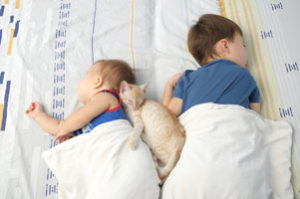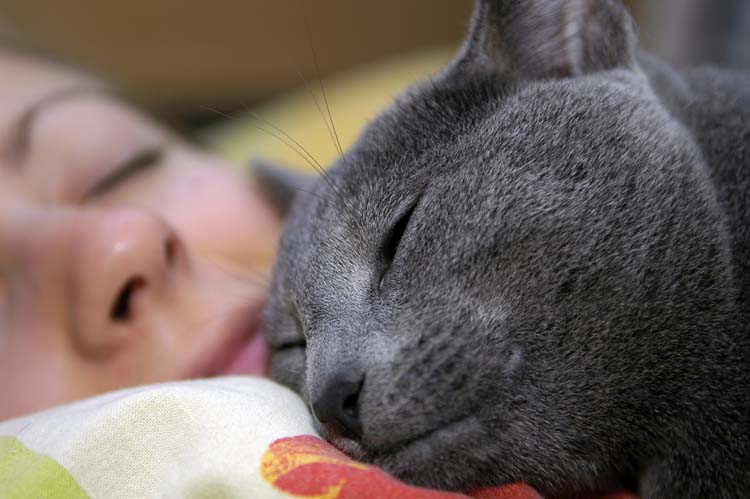Sleeping with Cats
You may ask yourself the question: should I be sleeping with my cats? There are reasons why you should—and shouldn’t—snuggle up with your feline.

Studies show that nearly two-thirds of owners sleep with their cats. The practice is controversial, however, because of concerns about disease transmission and sleep disruption. Cats might be cuddly and adorable, but they can have nasty bacteria on their feet from the litterbox. Cats sleep 16 hours a day, usually in short naps, and might not be in the mood to lie still for 8 hours. There are ways to mitigate these negative effects if you still want to keep sleeping with you cats.
There’s no denying the pros of this arrangement. Having a warm, purring cat or two in bed with you is calming and a stress releaser. It promotes bonding with your pets and can help you fall asleep. Cats don’t take up any more room than a small dog. And although they aren’t as good as dogs at raising the alarm when something’s wrong, cats have been known to wake up their people when they smell smoke.
Another reason people let their cats into bed with them is that it’s the path of least resistance. While a dog can be trained to sleep in a dog bed on the floor or in a crate, it’s very hard to retrain a cat who has been allowed on the bed.

There are certain circumstances under which cats should be banned from the bed. Never let your cat sleep with a child under 4 or 5, and especially not with a baby. If you or your partner have asthma or allergies, your cat shouldn’t be allowed in the bedroom at all. Ideally, you should make your bedroom off limits from day one. Kitty will be less likely to scratch on the door and cry to be let in if she doesn’t think of your room as part of her territory.
If you must banish your cat from the bedroom after she has already been allowed to sleep there, try putting up two dog or baby gates, one on top of the other, in the hallway outside to keep her away from the door while she gets used to the new arrangement. Provide her with distractions, such as treat-dispensing toys, and a comfortable bed elsewhere in the house.
If the problem is sleep disruption, try tiring your cat out by playing with her for a while right before bedtime. Give her a treat or her evening meal right before bed. Sleep with the door ajar so she can get to her food, water and litterbox at night without disturbing you. Toss a few toys outside the bedroom so she’ll have something to do if she gets restless at night. Avoid noisy toys, of course.

Cats and dogs have been known to transmit parasites and serious diseases like meningitis to the people they sleep with. There is even a case where a boy contracted bubonic plague from his flea-infested cat. The obvious solution is to make sure your cat is healthy. Talk to your vet about flea and parasite prevention. Take your cat in for regular wellness exams and keep her up to date on vaccinations. Wash your hands after dealing with the litterbox and keep the box clean. After petting your cat, wash your hands before preparing food.
In any case, these sorts of disease transmissions are extremely rare. As psychology professor Hal Herzog wrote on the Psychology Today website, “I expect the odds that you will contract the plague or meningitis from sleeping with your [pet] are somewhere between your chances of being killed by a shark (one in 4 million) and being struck by lightning (one in 80,000).”
Unless you have allergies or a compromised immune system, there’s every reason to keep sleeping with your cats.
Full disclosure: Lisa King sleeps with three cats.
About the Author: Lisa King is a freelance writer living in Southern California. She is the former managing editor of Pet Product News International, Dogs USA, and Natural Dog magazines. Lisa is also the author of the well-received murder mystery novel “Death in a Wine Dark Sea” and the recently released “Vulture au Vin.”






